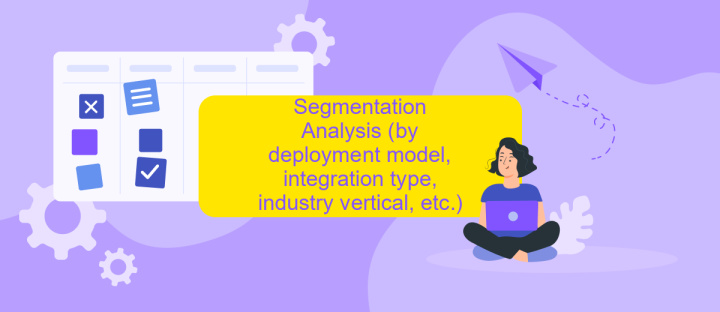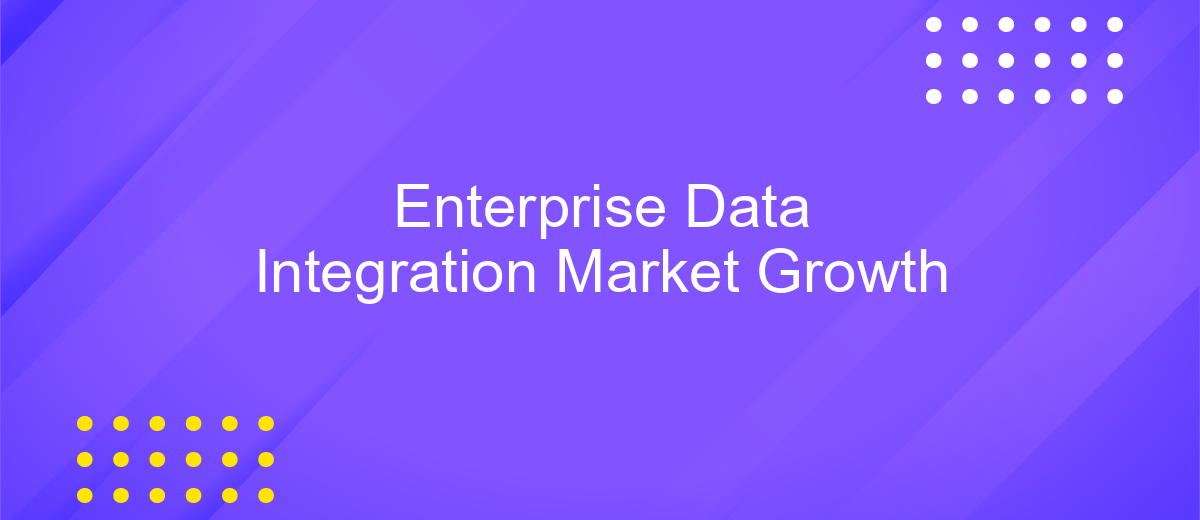Enterprise Data Integration Market Growth
The Enterprise Data Integration Market is experiencing significant growth as organizations increasingly recognize the value of seamless data connectivity across diverse systems. This market expansion is driven by the rising demand for real-time data access, improved decision-making capabilities, and enhanced operational efficiency. As businesses strive to harness the power of big data and analytics, robust integration solutions are becoming essential to maintain a competitive edge in today's data-driven landscape.
Market Overview and Size
The Enterprise Data Integration market is experiencing significant growth, driven by the increasing demand for seamless data management solutions across various industries. As businesses continue to generate vast amounts of data daily, the need for efficient integration tools that ensure data consistency and accessibility becomes paramount. This market is characterized by the adoption of advanced technologies such as cloud computing, artificial intelligence, and big data analytics, which are transforming how organizations manage and utilize their data assets.
- Growing demand for real-time data integration solutions.
- Increased adoption of cloud-based platforms.
- Rising focus on regulatory compliance and data governance.
- Technological advancements in AI and machine learning.
- Expansion of IoT and connected devices.
With the proliferation of digital transformation initiatives, businesses are increasingly investing in enterprise data integration solutions to enhance operational efficiency and gain competitive advantage. The market size is projected to expand as organizations prioritize data-driven decision-making and seek to leverage integrated data for improved business insights. This growth trajectory is expected to continue, fueled by innovations and strategic partnerships within the industry.
Key Drivers and Challenges

The growth of the Enterprise Data Integration Market is primarily driven by the increasing demand for streamlined data management solutions across various industries. Organizations are seeking efficient ways to integrate diverse data sources to enhance decision-making and operational efficiency. The rise of cloud-based platforms and the proliferation of big data are also significant contributors, as they necessitate robust integration solutions to handle large volumes of data seamlessly. Furthermore, the growing adoption of IoT devices and the need for real-time data processing are propelling the demand for advanced integration tools, such as those offered by ApiX-Drive, which facilitate seamless connectivity between disparate systems.
However, the market faces several challenges that could hinder its growth. Data security and privacy concerns remain paramount, as organizations are wary of potential breaches during the integration process. Additionally, the complexity of integrating legacy systems with modern applications poses a significant challenge, requiring specialized solutions and expertise. The rapid pace of technological advancements also demands continuous updates and scalability of integration solutions, which can be resource-intensive. Addressing these challenges requires a strategic approach, focusing on robust security measures, comprehensive training, and scalable integration platforms like ApiX-Drive to ensure seamless and secure data integration.
Segmentation Analysis (by deployment model, integration type, industry vertical, etc.)

The Enterprise Data Integration market is characterized by diverse segmentation, which allows businesses to tailor solutions to their specific needs. This segmentation is crucial for understanding the market dynamics and making informed decisions about technology adoption.
- Deployment Model: The market is segmented into cloud-based and on-premises solutions. Cloud-based integration offers scalability and flexibility, while on-premises solutions provide enhanced control and security.
- Integration Type: Key types include data consolidation, data federation, and data propagation. Data consolidation focuses on merging data from various sources into a central repository, whereas data federation provides a virtual view of data across multiple sources. Data propagation involves distributing data from one source to another.
- Industry Vertical: The market serves numerous industries, including healthcare, finance, retail, and manufacturing. Each industry has unique requirements, influencing the choice of integration solutions.
Understanding these segments helps organizations select the appropriate data integration strategies that align with their operational goals and industry demands. As the market evolves, businesses must stay informed about trends in each segment to maintain a competitive edge.
Competitive Landscape and Key Players

The enterprise data integration market is characterized by intense competition, driven by the rapid adoption of digital transformation across various industries. Companies are increasingly seeking solutions that enable seamless data connectivity and interoperability, fostering a vibrant ecosystem of providers offering diverse integration tools and platforms.
Key players in this market are leveraging advanced technologies such as artificial intelligence, machine learning, and cloud computing to enhance their offerings. These innovations are aimed at improving data accuracy, scalability, and real-time processing capabilities, thereby providing businesses with a competitive edge.
- IBM Corporation
- Microsoft Corporation
- Oracle Corporation
- SAP SE
- Informatica
- TIBCO Software Inc.
These companies are not only focusing on product innovation but also on strategic partnerships and acquisitions to expand their market presence. By collaborating with other technology providers and industry leaders, they aim to deliver comprehensive solutions tailored to the specific needs of their clients, further solidifying their positions in the enterprise data integration landscape.
- Automate the work of an online store or landing
- Empower through integration
- Don't spend money on programmers and integrators
- Save time by automating routine tasks
Future Trends and Growth Opportunities
The enterprise data integration market is poised for significant transformation driven by the increasing adoption of cloud-based solutions and the rise of artificial intelligence. As organizations strive to enhance their data management capabilities, the demand for seamless integration tools that can handle diverse data sources is expected to grow. Businesses are likely to invest in platforms that offer real-time data processing and advanced analytics, enabling them to make informed decisions swiftly. The shift towards hybrid and multi-cloud environments will further necessitate robust integration solutions that ensure data consistency and security across various platforms.
In this evolving landscape, services like ApiX-Drive are gaining traction by offering user-friendly integration setups without the need for extensive coding knowledge. Such platforms empower enterprises to automate workflows and synchronize data across multiple applications effortlessly. As companies look to streamline operations and reduce manual data handling, the ability to configure integrations quickly and efficiently will become a key differentiator. Moreover, with the growing emphasis on data privacy and compliance, integration solutions that provide secure, scalable, and customizable options will present lucrative growth opportunities in the market.
FAQ
What is Enterprise Data Integration?
Why is the Enterprise Data Integration market growing?
What are the key benefits of implementing data integration solutions?
How can businesses implement data integration solutions effectively?
What challenges do organizations face in data integration?
Apix-Drive is a simple and efficient system connector that will help you automate routine tasks and optimize business processes. You can save time and money, direct these resources to more important purposes. Test ApiX-Drive and make sure that this tool will relieve your employees and after 5 minutes of settings your business will start working faster.


